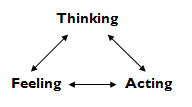 In an earlier post, we introduced the concept of acceptance and talked about some of its benefits. Acceptance is one of the foundations of a mindfulness-based approach to treating anxiety and depression called Acceptance and Commitment Therapy (ACT).
In an earlier post, we introduced the concept of acceptance and talked about some of its benefits. Acceptance is one of the foundations of a mindfulness-based approach to treating anxiety and depression called Acceptance and Commitment Therapy (ACT).
In the Acceptance and Commitment Therapy-based workbook, The Mindfulness and Acceptance Workbook for Depression, Kirk Strosah and Patricia Robinson explain some misconceptions people often have about acceptance. First, they define acceptance:
The word “acceptance” has a lot of different meanings, some of which we want to challenge. The type of acceptance we encourage you to practice is best thought of as a voluntary, intentional stance of nonjudgmental awareness of thoughts, feelings, memories, and sensations in the context of a triggering event.
Then they describe the difference between acceptance and resignation:
Please don’t mistake acceptance for resignation, or giving in to a life of misery. This would be akin to telling a person to just get used to being depressed for the rest of his or her life, something we would never condone.
Many people are unclear about the concept of acceptance in therapy. They believe that accepting something means it will never change, and since they can’t live with the way things are, talking about acceptance seems impossible.
However, acceptance merely means accepting the way things are at this particular moment in time. It doesn’t require that you agree with the circumstance, that you like the circumstance, or that you hope it will always be this way. It is merely acknowledgment of what is.
It is an acknowledgement of the present condition without judgment of the condition being good or bad. It is only from this posture of acceptance that you can objectively determine the appropriate course of action. In contrast, resignation is the inclusion of the judgment. It says, okay, I’ll live with it the way it is, but I don’t like it.
They go on to explain that acceptance doesn’t mean you’ve failed:
Acceptance is not an admission of failure or defeat. When you give up the struggle with unwanted private events, you’re simply giving up something that has never worked. This form of acceptance simply means that you recognize that this strategy isn’t going to work. Acceptance is the first step towards success—to building a more flexible and effective response to the situation.
Finally, they point out the difference between acceptance and tolerance:
Another common misconception about acceptance is to confuse it with toleration. Think of the distinction between toleration and acceptance this way: Toleration is a form of acceptance “with strings attached.” You’re only willing to accept distress or suffering up to a certain level and no further.
Carl Jung said, “We cannot change anything unless we accept it. Condemnation does not liberate, it oppresses.” Acceptance is a starting point from which you can begin to address your pain and suffering, rather than trying to fight and suppress and avoid the reality of your situation.
When you start to practice acceptance when faced with difficult situations, thoughts and feelings, your problems can begin to seem less insurmountable and become more manageable. If you can change something that’s causing you distress, then by all means, change it. But if it’s something you can’t change or that will take awhile to change, than accepting it can go a long way towards making it better.






Acceptance and commitment therapy is a great tool.
This is really hard to do but a must. I really appreciate your thoughts on this.
Greg, great blog, thanks. Enjoy ISIT.
Explaining the difference between acceptance and resignation is hard. I had to think about it for awhile, and came up with this: http://www.not-a-psychiatrist.blogspot.ca/2012/04/what-does-it-mean-when-friend-family.html